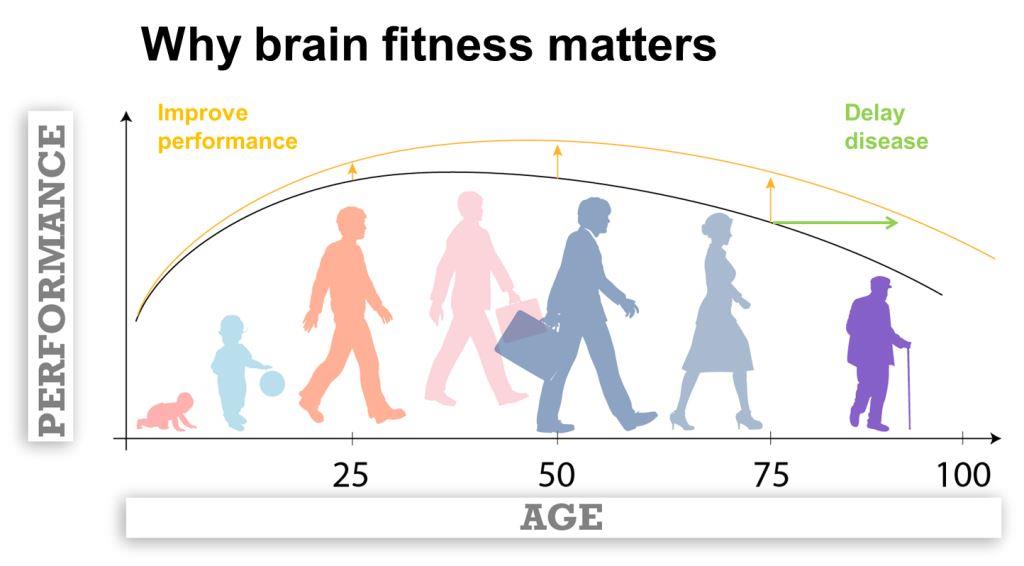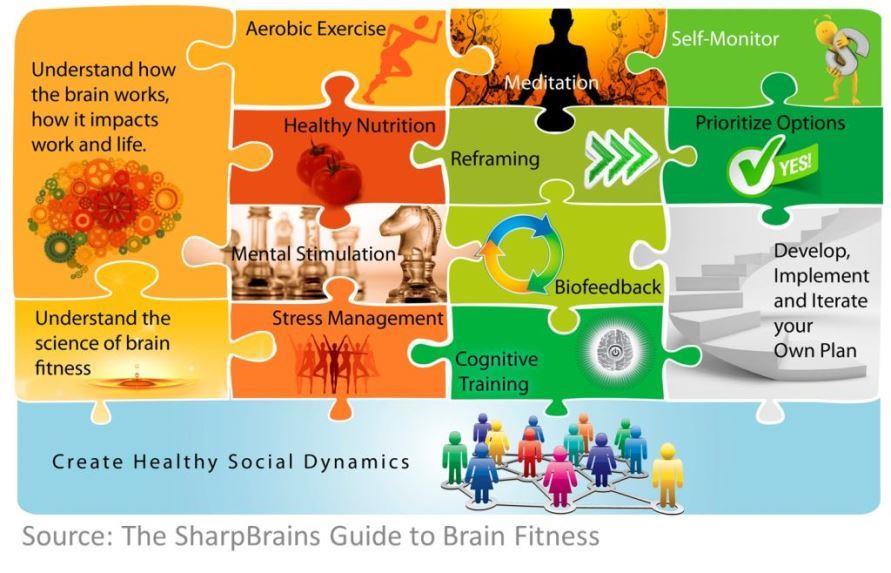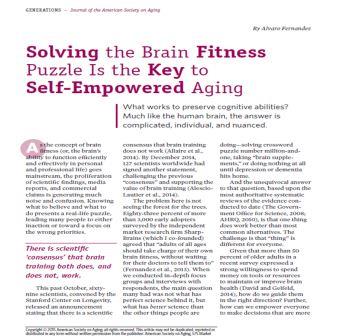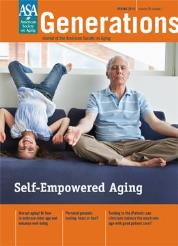Solving the Brain Fitness Puzzle Is the Key to Self-Empowered Aging
What works to preserve cognitive abilities? Much like the human brain, the answer is complicated, individual and nuanced.
As the concept of brain fitness (or, the brain’s ability to function efficiently and effectively in personal and professional life) goes mainstream, the proliferation of scientific findings, media reports, and commercial claims is generating much noise and confusion. Knowing what to believe and what to do presents a real-life puzzle, leading many people to either inaction or toward a focus on the wrong priorities.
This past October, sixty-nine scientists, convened by the Stanford Center on Longevity, released an announcement stating that there is a scientific consensus that brain training does not work (Allaire et al., 2014). By December, 127 scientists worldwide had signed another statement, challenging the previous “consensus” and supporting the value of brain training (Alescio-Lautier et al., 2014).
The problem here is not seeing the forest for the trees. Eighty-three percent of more than 3,000 early adopters surveyed by the independent market research firm SharpBrains (which I co-founded) agreed that “adults of all ages should take charge of their own brain fitness, without waiting for their doctors to tell them to” (Fernandez et al., 2013). When we conducted in-depth focus groups and interviews with respondents, the main question many had was not what has perfect science behind, but what has better science than the other things people are doing—solving crossword puzzle number one million and one, taking ‘brain supplements,’ or doing nothing at all until depression or dementia hits home.
And the unequivocal answer to that question, based upon the most authoritative systematic reviews of the evidence conducted to date (The Government Office for Science, 2008; AHRQ, 2010), is a resounding yes—one thing does work better than most common alternatives. The challenge is that “thing” is different for everyone.
Given that more than 50 percent of older adults in a recent survey expressed a strong willingness to spend money on tools or resources to maintain or improve brain health (David and Gelfeld, 2014), how do we guide them in the right direction? Further, how can we empower everyone to make decisions that are more likely to help with navigating the available scientific evidence and applying it in the way most relevant to a person’s circumstances and objectives?
First, we need to educate the public on a fuller, more nuanced approach that emphasizes a global view of brain fitness, one that is not restricted to the prevention or treatment of dementia, but encompasses the lifelong trajectory of one’s brain health and performance.
We May Not Stop Dementia, But We Can Prolong Function
Notice the opportunity presented in Figure 1 below. If we can help more people’s brain performance advance through life following the trajectory of the line on top, we would help millions to improve their quality of life and their productivity for years more and, at the same time, delay future morbidity, potentially halving the prevalence of Alzheimer’s Disease.

Figure 1. We May Not Stop Dementia, But We Can Prolong Function
Nothing has been shown to prevent dementia’s pathology, but there are evidence-based ways to improve and prolong brain functionality, and to reduce the probability of manifesting disease—a very hopeful message that often gets forgotten in the eternal search for the next “magic pill.”
To capture the opportunity, we need to master a new toolkit of interventions and assessments, combining lifestyle options and technologies as appropriate (Fernandez, Goldberg, and Michelon, 2013). Through our independent and comprehensive analysis of hundreds of randomized clinical trials and dozens of meta-analyses, conducted as preparation for the book The SharpBrains Guide to Brain Fitness: How to Optimize Brain Health and Performance at Any Age (Fernandez, Goldberg, and Michelon, 2013), we found multiple evidence-based ways to promote and protect a range of brain functions: aerobic exercise, learning a new language, mastering meditation, rotating through complex professional assignments, following the proper nutrition, volunteering, cognitive training, biofeedback and more.
Given space constraints, we cannot go into the specific guidelines for each of the pieces in the “brain fitness jigsaw puzzle” presented in Figure 2, but the often overlooked main finding is that based on best available evidence, no shoe fits all: different interventions work best for specific purposes and for specific populations.

Figure 2. How to Empower Adults to Solve the Brain Fitness Puzzle
Cross-training our brains
Brain fitness should begin with a basic understanding of how the brain works, followed by the pillars of a healthy lifestyle: balanced nutrition, aerobic exercise, stress management, mental stimulation, and social engagement.
Cross-training our brains—exercising a wide range of cognitive, emotional, and executive functions—can help us and build up targeted brain functions over time. Research-based methodologies include meditation, reframing (cognitive therapy), biofeedback, and cognitive training.
Where I see most people failing today is in how to prioritize options—how to identify one’s weak points and find suitable evidence-based solutions for action. Here are three simplified vignettes, adapted from The SharpBrains Guide to Brain Fitness (Fernandez, Goldberg, and Michelon, 2013), that show how important it is to identify personal priorities and, thus, the best tools, based upon an individual’s particular starting point, needs, and goals.
Charlotte is an accomplished 58-year-old reporter. She has been watching her diet for years. It is getting harder now, especially at work, for her to concentrate and to process complex new information, and she notices more memory lapses. Charlotte feels highly stressed these days, trying to juggle her demanding job and acting as her parents’ primary caregiver. To cope with stress, she often spends evenings watching TV for several hours.
Potential Solution: Charlotte’s schedule does not allow for much time for herself, and when she does find that time, she spends it watching TV. Unregulated stress may be a major factor behind her cognitive difficulties. She could start integrating exercise and meditation into her schedule, maybe in the evenings, spending a bit less time in front of the television, or going to the gym twice a week during lunchtime or on the weekends. Using HeartMath’s Inner Balance Trainer (see resource box, below) could help her quickly master stress regulation.
Julián, a recently retired 67-year-old financial advisor, finally has the time to take care of himself, and to swim often at the local community center. Still, he misses the constant interaction with clients and colleagues in the office. He feels that his mental power and speed are not what they used to be, so he is trying to “use it” by watching documentaries on TV and by raising his daily quota of crossword puzzles and Sudoku.
Potential Solution: Julián is trying to remain cognitively engaged, but not in ways that supply novelty, variety, and challenge—the ingredients of real mental exercise. His brain would be better served by volunteering, perhaps providing financial planning advice to low-income families for a nonprofit organization. He could use regular self-assessments such as Cogniciti or BrainBaseline (see resource box, below) to better monitor his memory and cognition over time and to inform conversations with his doctor.
Kelly, age 75, has been retired for a while. She stopped exercising when her mobility and strength declined. Her husband passed away four years ago. Though she has several good friends nearby, she is hesitant to drive to visit them. More and more, Kelly prefers to stay safe at home rather than risk taking the car, and so at times she feels lonely. She loves reading novels, in English as well as in her half-forgotten French.
Potential Solution: Kelly would benefit from resuming an appropriate exercise routine, perhaps a routine of light-to-medium exercise such as walking regularly and participating in chair yoga once a week. She could also join a book club, or better yet, find some contracts editing college essays or a related activity that would tap into her love of books. Given that her fear of driving inhibits these opportunities, it would make sense for her to prioritize safe-driving classes, and even use a cognitive training program aimed at safe-driving skills, such as brainHQ, or CogniFit Senior Driver (see resource box, below).
In summary, Charlotte, Julián, Kelly, and millions of other adults would benefit from high-quality information and education to help them to make effective brain fitness decisions, to help them navigate all options—ones that would address their unique circumstances and goals.
No one shoe fits all. Why should we believe the reverse of that maxim to apply to something as diverse and complex as the human brain?
–Alvaro Fernandez, M.A., M.B.A., is the co-founder and CEO of SharpBrains (www.sharpbrains.com), headquartered in Washington, D.C. He can be contacted at afernandez at sharpbrains dot com.
Resource Box: New Brain Fitness Tools
BrainBaseline: A free mobile app featuring dozens of cognitive tests that can be retaken over time, and that facilitate self-monitoring; www.brainbaseline.com/.
BrainHQ: A Web-based cognitive training program that includes Useful Field of View (UFOV) training (UFOV is an important component of safe driving); www.brainhq.com/.
Cogniciti: A free Web-based cognitive assessment designed to measure whether the test taker’s cognition is within a normal range given their age, or warrants a visit to the doctor; www.cogniciti.com/.
CogniFit Senior Driver: A Web-based cognitive training program that assesses and trains for ten driving-related cognitive skills; https://lifestore.aol.com/category/online-learning/cognifit-senior-driver.
HeartMath Inner Balance: A mobile Heart Rate Variability (HRV) sensor designed to help measure and regulate physiological stress; www.heartmath.com/innerbalance/.
References
Agency for Healthcare Research and Quality (AHRQ). 2010. Alzheimer’s Disease and Cognitive Decline. Rockville, MD: AHRQ. www.ahrq.gov/clinic/tp/alzcogtp.htm. Retrieved January 15, 2015.
Alescio-Lautier, B., et al., 2014. “Open Letter Response to ‘A Consensus on the Brain Training Industry from the Scientific Community.’ ” www.cognitivetrainingdata.org/. Retrieved January 15, 2015.
Allaire, J. C., et al., 2014. “A Consensus on the Brain Training Industry from the Scientific Community.” Max Planck Institute for Human Development and Stanford Center on Longevity. http://longevity3.stanford.edu/blog/2014/10/15/the-consensus-on-the-brain-training-industry-from-the-scientific-community/. Retrieved January 15, 2015.
David, P., and Gelfeld, V. 2014. 2014 Brain Health Research Study. Washington, DC: AARP. www.aarp.org/research/topics/health/info-2015/staying-sharper-study.html. Retrieved January 15, 2015.
Fernandez, A., Goldberg, E., and Michelon, P. 2013. The SharpBrains Guide to Brain Fitness: How to Optimize Brain Health and Performance at Any Age. Washington, DC: SharpBrains. http://mybook.to/brainfitness. Retrieved January 15, 2015.
Fernandez, A., et al., 2013. The Digital Brain Health Market 2012–2020: Web-based, Mobile and Biometrics-based Technology to Assess, Monitor and Enhance Cognition and Brain Functioning. Washington, DC: SharpBrains. https://sharpbrains.com/market-report/. Retrieved January 15, 2015.
The Government Office for Science. 2008. Foresight Mental Capital and Wellbeing Project: Final Project Report. London, UK: The Government Office for Science. https://www.gov.uk/government/publications/mental-capital-and-wellbeing-making-the-most-of-ourselves-in-the-21st-century. Retrieved January 15, 2015.
_____________________________________________________________
Copyright © 2015 American Society on Aging: all rights reserved. This article, part of Generations’ Spring 2015 special issue on Self-Empowered Aging, may not be duplicated, reprinted or distributed in any form without written permission from the publisher: American Society on Aging, 575 Market St, Suite 2100, San Francisco, CA 94105; email: info@asaging.org. For information about ASA’s publication’s visit http://www.asaging.org/. For information about ASA membership visit http://www.asaging.org/join.


